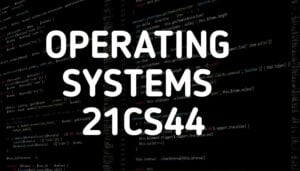
Operating Systems 21CS44
Module 1`
Introduction to operating systems, System structures: What operating systems do; Computer System organization; Computer System architecture; Operating System structure; Operating System operations; Process management; Memory management; Storage management; Protection and Security; Distributed system; Special-purpose systems; Computing environments.
Operating System Services: User – Operating System interface; System calls; Types of system calls; System programs; Operating system design and implementation; Operating System structure; Virtual machines; Operating System generation; System boot.
Process Management: Process concept; Process scheduling; Operations on processes; Inter process communication
Module 2
Multi-threaded Programming: Overview; Multithreading models; Thread Libraries; Threading issues. Process Scheduling: Basic concepts; Scheduling Criteria; Scheduling Algorithms; Multiple-processor scheduling; Thread scheduling.
Process Synchronization: Synchronization: The critical section problem; Peterson’s solution; Synchronization hardware; Semaphores; Classical problems of synchronization; Monitors.
Module 3
Deadlocks: Deadlocks; System model; Deadlock characterization; Methods for handling deadlocks; Deadlock prevention; Deadlock avoidance; Deadlock detection and recovery from deadlock.
Memory Management: Memory management strategies: Background; Swapping; Contiguous memory allocation; Paging; Structure of page table; Segmentation
Module 4
Virtual Memory Management: Background; Demand paging; Copy-on-write; Page replacement; Allocation of frames; Thrashing.
File System, Implementation of File System: File system: File concept; Access methods; Directory structure; File system mounting; File sharing; Protection: Implementing File system: File system structure; File system implementation; Directory implementation; Allocation methods; Free space management.
Module 5
Secondary Storage Structures, Protection: Mass storage structures; Disk structure; Disk attachment; Disk scheduling; Disk management; Swap space management. Protection: Goals of protection, Principles of protection, Domain of protection, Access matrix, Implementation of access matrix, Access control, Revocation of access rights, Capability- Based systems.
Case Study: The Linux Operating System: Linux history; Design principles; Kernel modules; Process management; Scheduling; Memory Management; File systems, Input and output; Inter-process communication.
online casino for us players paypal
References:
https://careers.universalair.aero
australian online casinos that accept paypal
References:
https://career.abuissa.com/
paypal casino canada
References:
trabajaensanjuan.com
online casino paypal einzahlung
References:
worldwiderecruiters.ca
Welcome to LEON casino, the premier destination for Australian players seeking explosive entertainment and massive
rewards in 2025. Reliable casinos offer 24/7 customer support via
live chat or email — not just a FAQ page. Look for transparent terms,
realistic wagering requirements, and no sneaky restrictions on games or cashouts.
It’s all designed to give Aussie players the flexibility
and convenience they want without sacrificing performance
or security. There’s no need to download anything
— the instant-play mobile version works like a charm. Leon Casino
brings the full online gaming experience straight to your pocket — anytime, anywhere.
Some bonuses come with wagering requirements that may be challenging.
Dedicated customer service team available round the clock for Australian players.
In this review, we’ll dig into what makes Leon worth
your time — from its huge slot collection and live dealer action to
its payout speeds and mobile usability.
References:
https://blackcoin.co/malina-casino-australia-your-ultimate-gaming-destination/
Players can choose from a wide range of pokies, blackjack, roulette, baccarat, video poker,
and live dealer games. Birthday bonuses range from 25 free spins for Bronze to $500 bonus
credit for Diamond members. This structure clearly targets the slot-spinning majority while making it harder for blackjack and roulette players to climb tiers.
Always ensure you use official channels and contact support if a site mirror is required.
The Interactive Gambling Act affects operators; however, Australian residents may
legally play at licensed offshore sites like WinSpirit where local law permits.
If you reach VIP tiers, higher limits may be available—but the same rules
of bankroll discipline apply. WinSpirit features progressive and fixed-jackpot slots that can produce life-changing prizes.
References:
https://blackcoin.co/fair-go-casino-login-guide/
Dieses Betsoft-Spiel bietet elegante Grafiken und
lebendige Visuals, die etwas frischen Wind in das überarbeitete ägyptische Slot-Thema bringen. Wir haben die meistgespielten Spielautomaten auf unserer Website unten mit den wesentlichen Informationen für
jedes Spiel zusammengestellt. Teilweise sogar durch die GGL, die damit beauftragt
ist die Regulierung von online Casinos in Deutschland zu übernehmen. Die auf unserer Website vorgestellten Slot-Entwickler sind jedoch von Glücksspielregulierungsbehörden lizenziert.
Einer der größten Vorteile des Spielens von Slots kostenlos hier ist, dass Sie keine Anmeldeformulare ausfüllen müssen.
Solche Optionen werden normalerweise im Hauptmodus aktiviert, aber bei einigen Spielautomaten werden sie auch während Freispielen oder
Re-Spins zur Verfügung gestellt. Sie unterscheiden sich von Freispielen und Bonusrunden dadurch, dass sie jederzeit
ausgelöst werden können, unabhängig von der Spielsituation. Wenn Sie von einem mobilen Gerät aus spielen, müssen Sie das Spiel einfach schließen und dann erneut öffnen. Alles, was Sie tun müssen, um loszulegen, ist, das Spiel auszuwählen, das Ihnen gefällt, auf sein Bild zu klicken und in aller Ruhe zu
spielen. Es braucht nichts weiter als Ihren echten Wunsch, auf unserer Webseite zu spielen – Sie brauchen nichts herunterzuladen oder zu installieren, da alle unsere Spielautomaten direkt in Ihrem Browser verfügbar
sind.
Die zugrunde liegende Software muss funktionieren und die Online Spiele müssen fair
ablaufen. 100 % Einzahlungsbonus bei Einzahlungen bis zu 50€.
100% Einzahlungsbonus bei Einzahlungen bis zu 100€.
References:
https://online-spielhallen.de/iwild-casino-freispiele-dein-weg-zu-kostenlosen-spins-und-gewinnen/